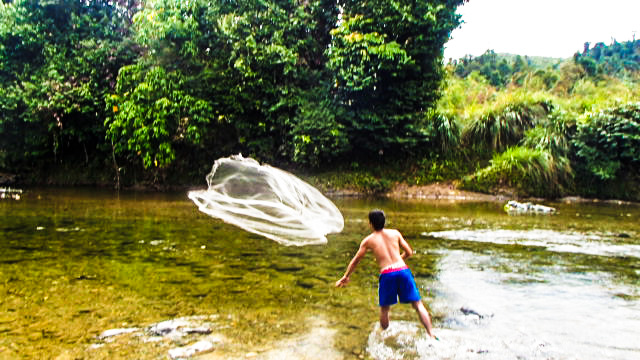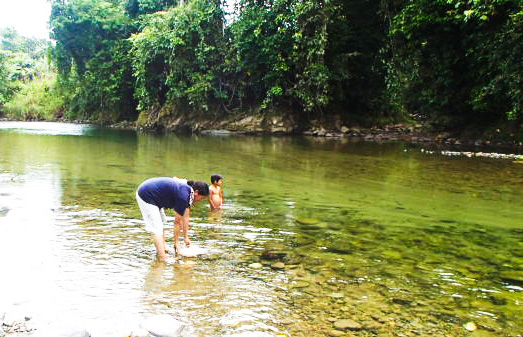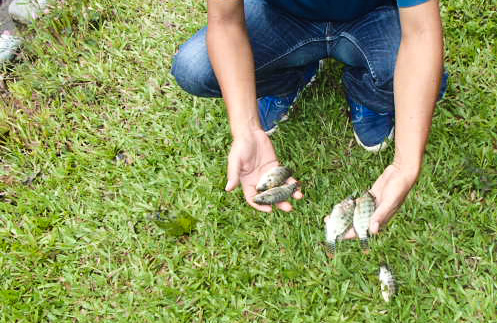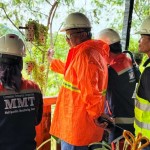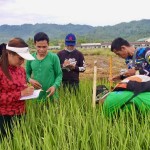-
Sustenance and livelihood. A resident of Barangay Pulang Bato casts his net in Dipili River. This has been his family's daily food source - where once they could not even wade in the waters laden with toxic chemicals from illegal mining.
-
A mother washes plates while her child takes time to swim in the clear waters of Dipili River. Gone are the days when it was a dangerous place to wade because of toxic chemicals thrown by illegal miners.
-
Fresh catch. A Bayog resident shows his daily catch from a single throw of his net. This only proves that Dipili River is now abundant with fish.
After the stoppage of illegal small-scale mining, fish once again find their way to Bayog’s main tributary
Bayog, Zamboanga del Sur / July 2017 - Marginalized residents of two isolated villages in Bayog Municipality who were once unwilling hosts to illegal miners say that the Dipili River – which traverses their respective areas – can once again provide them sustenance and livelihood.
“Sauna, hadlok man gani mi motaak sa tubig tungod sa chemicals, manguha pa kaha mi ug isda,” (Before, we were afraid to wade in the water because of the chemicals – how much more if we fish in the river), said Edwin Angcunoy, a resident of Sitio Dimalinao in Bayog.
“Now we can catch different kinds of fish like tilapia, paitan, ulang and others,” he said, adding that the new source of food helps them a lot in their daily nutrition as the community only thrives on corn and banana as staple food.
The residents claim that over a decade of illegal mining in their area left Dipili River extremely polluted from the disposal of cyanide and nitric acid, which the operators used in extracting gold from ore.
Second life
“Sometimes, fish appeared to be transparent and its tissues so soft due to the chemicals used by the illegal miners who threw these into the river. The fish before really could not be eaten,” said Pulang Bato Councilor Agustin Bahian.
“Now, we can get fish, take a bath and wash in the river,” he added, enthusiastic that Dipili’s return to vitality also brought the tributary’s ecosystem back to life.
Pulang Bato and Dimalinao are poor and isolated villages situated below Balabag Hill where thousands of illegal small scale miners were previously nestled for more than a decade.
In October 2012, through a Cease and Desist Order, the provincial government of Zamboanga del Sur and the Department of Environment and Natural Resources (DENR) put a stop to illegal mining and its operations that destroyed the environment.
Time to heal
But it took some time before the river became clean, they said.
Mining company, TVI Resource Development Philippines Inc. (TVIRD), is primed to replace illegal mining operations as it has both legal permits and the social license to mine the area. More importantly, it plans to conduct environmental clean-up once it brings operations on-stream.
Aside from the Environment Compliance Certificate (ECC), the Declaration of Mine Project Feasibility (DMPF) and approval of the Social Development and Management Program from the DENR, the company also earned the support of the indigenous peoples living in the area and that of the local government units of Bayog Municipality and Zamboanga del Sur Province.
The residents of Dimalinao and Pulang Bato are pinning their hopes for better lives under the company who will soon begin to operate in the area. After suffering under the regime of the illegal miners, they too needed time to heal from their exploitive operations.
Revitalization
TVIRD Community Relations Manager Lope Dizon said that the company’s operations is just a matter of time. The river will continue to be clean as the company will establish a tailings dam for waste materials storage through a catchment area – and not thrown into the tributaries like in years past, he said.
Meanwhile, Pulang Bato village chairperson, Felisa Antonio, is hoping that the company will help them in establishing a potable water system in the barangay. Dizon said that the company will give priority to this need once it operates in the area.
The company will likewise help the farmers in planting trees like rubber, cacao or coffee all of which can help augment their income, added Dizon.
The villagers admit that with their very low income, they can only afford to send their children to elementary school. Nonetheless – with the revitalization of both the community and its natural environment – they hope that this too will change.
*******

